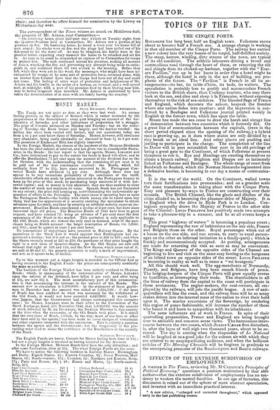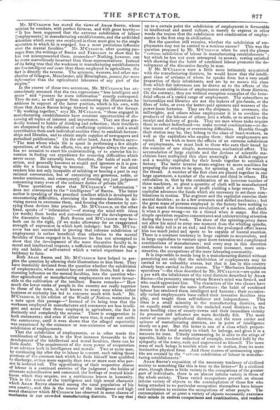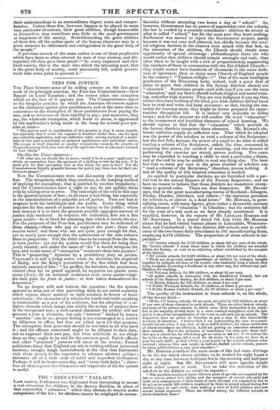EFFECTS OF THE EXTREME SUBDIVISION OF EMPLOYMENTS.
A WRITER in The Times, reviewing Mr. M'CuLcocu's Principles of Political Economy,* questions a position maintained by that able author—that the extreme subdivision of employments has no ten- dency to weaken the mental faculties. In our age of factories, this discussion is raised out of the sphere of mere abstract speculation, and invested with an immediate practical interest.
• A new edition, "enlarged and corrected throughout," which appeared early in the hut publishing-season.
Mr. M'Cur..xocs has stated the views of ADAM SMITH, whose opinion he combats, with perfect fairness, and with great brevity-
" It has been supposed that the extreme subdivision of labour [employments] in manufacturing establishments, and the undivided attention which every one employed in them must give to the single operation in which he is engaged, has a most pernicious influence
over the mental faculties." Mr. Wenntocit, after quoting pas- sages from the writings of SMITH and FERGUSON to show that he
has not misrepresented them, proceeds—" Nothing, however, can be more marvellously incorrect than these representations. Instead of its being true that the workmen in manufacturing establishments are less intelligent and acute than those employed in agriculture, the fact is directly the reverse. The spinners, weavers, and other me- chanics of Glasgow, Manchester, and Birmingham, possess far more information than the agricultural labourers of any part of the empire." In the course of these two sentences, Mr. M'Cur.noca has un- consciously assumed that the two expressions "less intelligent and acute" and "possess far more information" exactly correspond.
They do not ; as will appear from contrasting the illustrations he adduces in support of the latter position, which is his own, with
those that ADAM SMITH brings forward in support of the former.
"By working together," says Mr. M'CuLnoctr, "those engaged in manufacturing establishments have constant opportunities of dis- cussing all topics of interest and importance. They are thus gra- dually trained to habits of thinking and reflection ; their intellects are sharpened by the collision of conflicting opinions ; and a small contribution from each individual enables them to establish lecture-
ships and libraries, and to obtain ample supplies of newspapers and periodical publications." On the other hand, ADAM SMITH says-
" The man whose whole life is spent in performing a few simple operations, of which the effects, too, are perhaps always the same, has no occasion to exert his understanding, or to exercise his in- vention in finding out expedients for removing difficulties which never occur. He naturally loses, therefore, the habit of such ex- ertion, and generally becomes as stupid and ignorant as it is pos- sible for a human being to become. The torpor of his mind renders him not only incapable of relishing or bearing a part in any rational conversation, but of conceiving any generous, noble, or tender sentiment, and consequently of forming any just judgment -concerning many even of the ordinary duties of private life."
These quotations show that M'Cum.ocia's " information " does not correspond to the "intelligence" of SMITH. The latter
author is speaking of that practical intellect which is developed by encountering difficulties, exercising the inventive faculties in de- vising means to overcome them, and forming the character by car- rying those devices into practice. Mr. M'Cunnocff, on the other hand, speaks of "information "—of storing the mind with ideas (or words) from books and conversations—of the development of the discursive faculty. Both Stara and M'Cunnoca may be— both are in the right, (if we make allowance for an exaggerated strength of expression in which both indulge) : but Mr. MiCtm- Locst has not succeeded in proving that extreme subdivision of employment is rather beneficial than otherwise to the mental faculties of those engaged in it, because he has not attempted to show that the development of the mere discursive faculty is, in moral and intellectual respects, a sufficient substitute for the saga- city and habits of self-control which a varied experience has a tendency to form.
Both ADAM SMITH and Mr. M‘Ctrukcir have helped to per- plex the question by allowing their illustrations to bias them. They
have insensibly deviated from the question whether the subdivision of employments, when carried beyond certain limits, had a dete- riorating influence on the mental faculties, into the question whe- ther agricultural or manufacturing employments are more favour-
able to the cultivation of the intellect. SMITH remarks—" How much the lower ranks of people in the country are really -superior
to those of the town, is well known to every man whom either business or curiosity has led to converse much with both." Mr. M'Cintanocu, in his edition of the Wealth of Nations, maintains in a note upon this passage—" Instead of its being true that the workmen employed in manufactures and commerce are less intelli- gent and acute than those employed in agriculture, the fact is distinctly and completely the reverse." There is exaggeration in both statements; and even if either were true, it could not settle the controversy, until it were shown that the alleged superiority was occasioned by the existence or non-existence of an extreme subdivision of employments. That the subdivision of employments, or in other words the combination of labour, is in the first instance favourable to the development of the intellectual and moral faculties, there can be little doubt. The acquirement of the mere power of cooperation is an advance both in intelligence and morals. Two or more men, by continuing day after day to labour in concert, each taking those portions of the common task which he finds himself best qualified to discharge, evince more sagacity than two or more men who per-
sist in isolated toil. The apportioning of their respective shares of labour is a continual exercise of the judgment ; the habits of alternate subordination and command, the feelings of mutual kind- liness which they acquire, are a continuous lesson in humanity. This is the source of the intelligence and high moral character which ADAM SMITH observed among the rural population of his own country, and this is the source of the intelligence and high moral character which M'Cum,ocei has observed in some classes of mechanics in our crowded manufacturing districts. To say that
up to a certain point the subdivision of employment is favourable to intellectual and moral culture, is merely to express in other words the truism that the subdivision and combination of employ- ments is the first step in civilization. But the question still remains, whether the subdivision of em- ployments may not be carried to a noxious excess ? This was the question proposed by Mr. M'Cura.ocst when he used the phrase "extreme subdivision of labour in manufacturing establishments "; but which he has not even attempted to answer, resting satisfied with showing that the habit of combined labour promotes the de- velopment of the discursive faculty in man.
If Mr. McCum.ocir were a little more intimately acquainted with the manufacturing districts, he would know that the intelli- gent class of artisans of whom he speaks form but a very small proportion of their inhabitants, and are by no means the class from which fair inferences can be drawn as to the effects of the very minute subdivision of employments existing in those districts. On the contrary, they are without exception examples of the bene- ficial effects of a varied range of employment. The subscribers to lectureships and libraries are not the makers of pin-heads, or the filers of bolts, or even the better-paid spinners and weavers of the power-loom factories. They are the shopmen, the overseers, the millwrights, and others whose employment it is to combine the products of the labours of others into a whole, or to attend to the receipt and delivery of goods. They are men whose tasks require them to reflect beforehand—to make mental combinations—to de- vise means of evading or overcoming difficulties. Humble though their station may be, they belong to the class of head-workers, as well as the capitalists who employ them : their employments are varied. If we wish to learn the effects of an extreme subdivision of employments, we must look to those who earn their bread by the exercise of one simple, monotonous, mechanical effort. The accumulation of large capitals and the devices of scientific ma- chinists have multiplied this class amazingly. A skilled engineer and a wealthy capitalist lay their heads together to establish a factory. The latter invents steam-engines to move machines for preparing the cotton to be spun, for spinning it, and for weaving the thread. A number of the first class are placed together in one large apartment, a number of the second and third in others. His calculation is, that by the combination of an immense number of these machines, so great a quantity of cloth will be manufactured • as to admit of a low rate of profit yielding a large return. The capitalist advances the funds which are necessary to set these com- binations in motion. The engineer and the capitalist exercise their mental faculties; so do a few overseers and skilled mechanics ; but the great mass of persons employed in the factory have nothing to do but watch the monotonous revolutions of a machine, and check it when it goes wrong—to tie a thread when it snaps. But this simple operation requires concentrated and unintermitting attention during the hours of work. The slave of the spinning-jenny dares not allow his mind to stray one moment from the whirling spindle, till his daily toil is at an end; and then the prolonged effort leaves him too much jaded and spent to be capable of mental exertion. There is a constant tendency in large capitals to accumulate, and in large capitalists to venture upon more extensive and complicated combinations of manufactures ; and every step in this direction contributes to render more limited, more incessant, more unin- structive, the occupations of the mere labouring community. It is impossible to reside long in a manufacturing district without perceiving not only that the subdivision of employments may be carried to an unhealthy excess, but that it has in this country already been carried to that excess. The "Mechanics Institution operatives "—the class described by Mr. M'Cum.oca—are quite on
a par with the inhabitants of the rural districts described by ADAM SMITH—the peasantry amonf whom Bnami's mind was formed, and who could appreciate him. The characters of the two classes have
been formed under the same influences : the habit of combined labour has rendered them intelligent and humane ; their occasion- ally varied employments have called their inventive faculties into play, and taught them self-reliance and independence. This class is a small minority in the manufacturing districts, and an equally small minority in the secluded rural districts ; in the more bustling class of county-towns and their immediate vicinity its presence and influence are more decidedly felt. The mere carter of remote agricultural districts, and the mere carder and spinner of manufacturing districts, are in point of intelligence nearly on a par. But the latter is one of a class which prepon- derates in the local society to which he belongs, and gives it in a measure its tone. Utterly unreasoning, he is alive to the stings of appetite, liable to the seduction of example, rendered bold by the sympathy of the many, rude and ungoverned as himself. The mere mass of such beings is terrible when set in motion, from its mere instinctive physical force. And those masses of unreasoning appe- tite are created by the "extreme subdivision of labour in manufac- turing establishments."
ADAM SMITH'S exposition of the necessary tendency of civilized society to something like this is true to the letter—" In a civilized state, though there is little variety in the occupations of the greater part of individuals, there is an almost infinite variety in those of
the whole society. These varied occupations present an almost infinite variety of objects to the contemplation of those few who being attached to no particular occupation themselves have leisure and inclination to examine the occupations of other people. The contemplation of so great a variety of objects necessarily exercises their minds in endless comparisons and combinations, and renders their understandings in an extraordinary degree acute and compre- hensive. Unless these few, however, happen to be placed in some very particular situations, their great abilities, though honourable to themselves, may contribute very little to the good government or happiness of the society. Notwithstanding the great abilities of these few, all the nobler parts of the human character may in a great measure be obliterated and extinguished in the great body of the people." A previous remark of the same author is one of those prophecies which have been so often uttered by men of true wisdom, and dis- regarded till time gave them proof—" In every improved and civi- lized society, this is the state into which the labouring poor, that is the great body of society, must necessarily fall, unless govern- ment take some pains to prevent it."




























 Previous page
Previous page